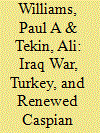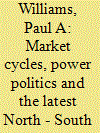| Srl | Item |
| 1 |
ID:
083616


|
|
|
|
|
| Publication |
2008.
|
| Summary/Abstract |
Many have linked the US-led invasion of Iraq to its oil resources, leading some observers to question Caspian energy prospects. This article analyzes how the Iraqi occupation and Caspian oil prospects have been inter-linked, via the evolution of American and Turkish assessments of Iraq and the Caspian region. It shows that, contrary to initial expectations, the occupation of Iraq bolstered the Baku-Tbilisi-Ceyhan project as well as a number of other increasingly significant natural gas export pipelines
|
|
|
|
|
|
|
|
|
|
|
|
|
|
|
|
| 2 |
ID:
078946


|
|
|
|
|
| Publication |
2007.
|
| Summary/Abstract |
Energy trade periodically aligns Northern importing - consuming countries against predominantly Southern producing - exporting countries. Conflict appears to follow a cyclical pattern, whereby Northern firms invest in developing Third World hydrocarbon resources to meet consumer demand until market conditions enable unilateral efforts by host sovereigns to augment fiscal take and ownership share and to impose output restrictions, thereby elevating prices and revenues. Although markets eventually correct themselves, major consuming-country governments, to the extent that seller's markets attributable to exporter actions harm short-term consumer welfare and alternative options for restoring buyer's markets are lacking, have varying incentives to support military intervention. Shifting market conditions and power balances suggest six ideal-typical energy trade conflict strategies. Finally, to the extent that exporting states succeed in converting higher hydrocarbon revenues into energy-intensive economic growth, co-operative phases within this conflict pattern could yield to increasingly zero-sum inter-consumer rivalry.
|
|
|
|
|
|
|
|
|
|
|
|
|
|
|
|